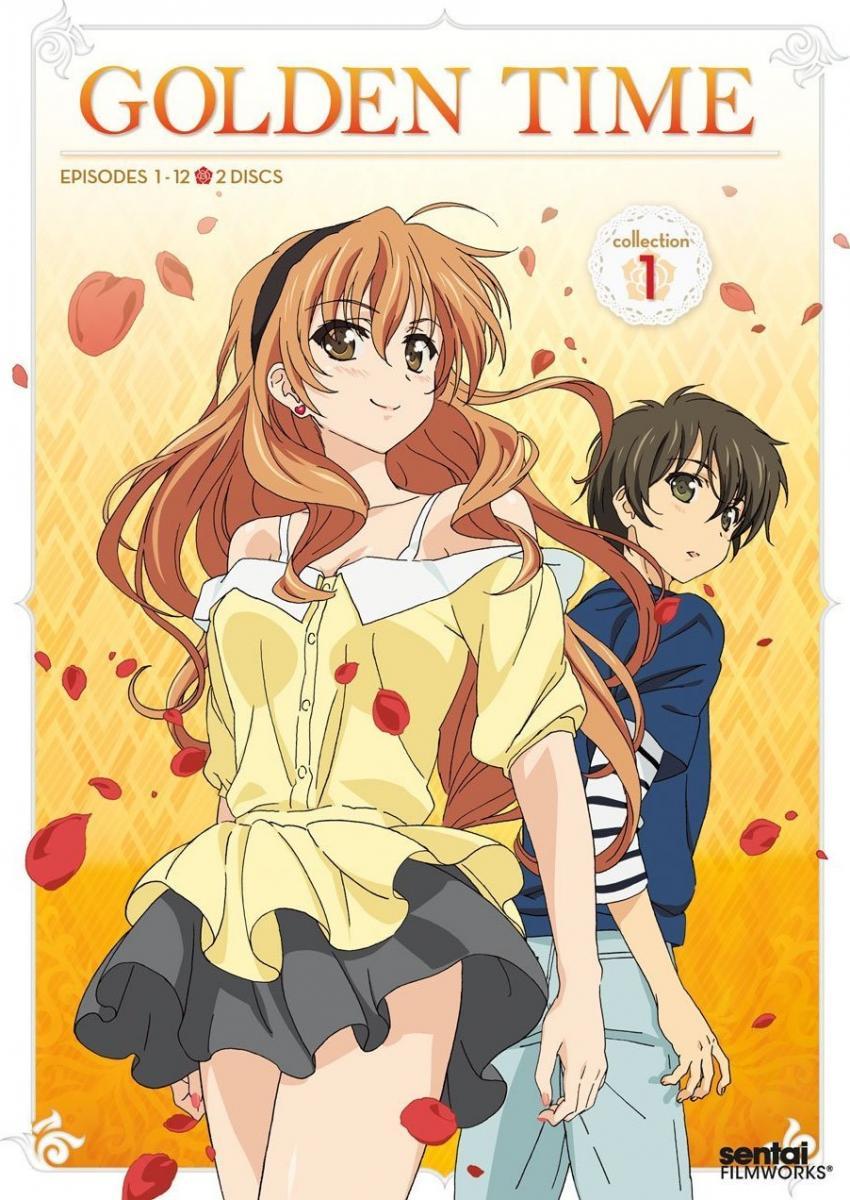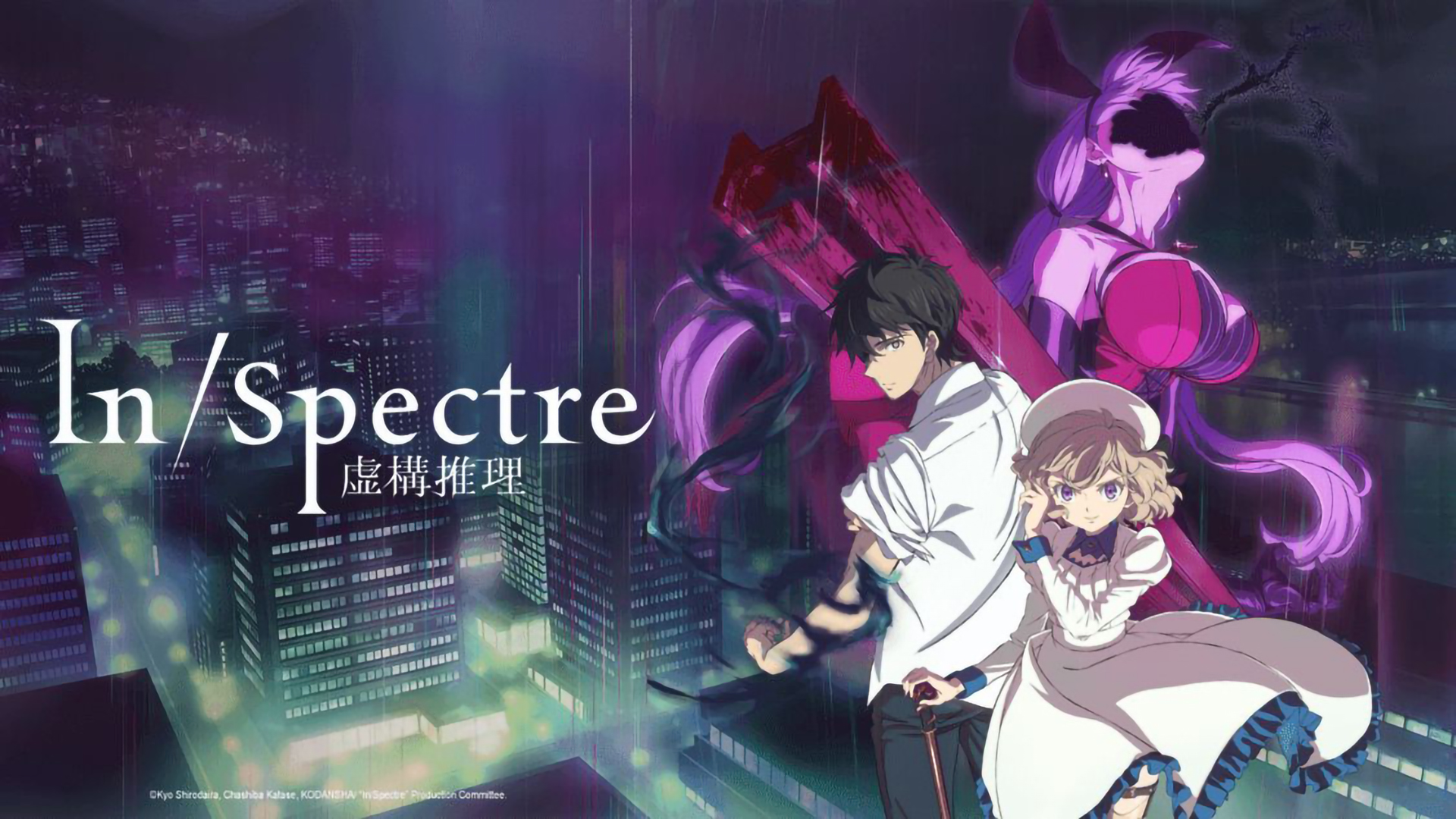Anime-BAWklog: Finished Series A-Z (Part III)
Another #AniMonday is upon us, and your favorite Ticketmaster (with movie theaters closed for the foreseeable future, anyway) has just overcome another educational hurdle! Intermediate Accounting I at WGU is harder than Ben Grimm's adamantium jockstrap, I didn't pay enough attention to the material the first time through, and I failed like a YouTuber planking on Jello. But now I've put that class behind me with flying colors, with my sights set on the three remaining, super-easy, super-boring installments of my fifth term of virtual college.
First, though, a little breather to get through more of the Anime-BAWklog, starting with something a bit controversial in the anime fandom:
Fairy Gone—anime fans don't like this series. It has ugly CGI, derivative plot mechanics, and stereotypical characters. But I liked it anyway. In a steampunk world, opening in the wake of a terrible war, Fairy Gone focuses on "Fairy Soldiers," human soldiers who have been implanted with the organs of deceased nature monsters called Fairies, giving them enhanced physical capabilities and the ability to summon the spirits of their respective Fairies to fight alongside them--this is the "ugly CGI" part of the massive otaku hate-on for this series. One day, the main characters encounter a female sniper with a complicated past who gets naturally possessed by a Fairy, and they decide on a mutually beneficial relationship: the soldiers get to keep an eye on her and use her unique skills to protect their homeland, and she gets access to military resources so she can track down her missing childhood friend (a thief and assassin working for the other side--because of course--who was also naturally Fairy-possessed). The hand-drawn animation and fight choreography are actually pretty good, the story is well-written despite being cliched at times, incorporating commentary on the nature of war, revenge, the necessity--or lack thereof--of man's war with nature and with himself, and corruption in religion and government. The characters likewise are stock archetypes, but even the most despicable of villains herein has a measure of depth and personality to them. Notwithstanding the criticisms it received, Fairy Gone clearly pleased enough people to warrant two seasons, so judge its merits and demerits for yourselves.
Flip-Flappers—two girls named after paprika and coconut use friendship to travel to a fairy-tale-inspired alternate reality in a race against supposedly evil, genetically modified children to collect MacGuffins for reasons, and learn that ingesting the MacGuffins turns them into magical girls. The usual “magic/friendship versus science” dichotomy is at play here, along with mysterious family drama and psychedelic animation. In theme and animation style, Flip Flappers has an FLCL/Panty & Stocking/18if vibe but makes slightly more sense and is considerably less mature than either, though it does have its darker moments. Some characters are unlikable or confusing to the point that they feel extraneous, and the main duo call out to each other so often that it seems like Flip Flappers was written for five-year-olds with ADHD and early-onset dementia, but I didn’t feel like there was anything more I wanted from the series when it was over. Some things (like the amorphous, nightmare fuel green rabbit and the annoying robot that followed Cocona and Papika everywhere) should have been left out, but overall, I was satisfied.
Golden Time—Fuck this series! It starts out with our main character on his first day of college, befriending an emotional flake named Mitsuo and falling in love with Mitsuo's annoying, clingy ex-girlfriend, Koko (who has the same English voice actress as the Real Girl, Christina Kelly, just so you get the idea of the annoyance level here). We eventually find out that Banri Tada, our leading dishrag, has amnesia from a bridge accident he suffered on his last day of high school. We are also introduced to Linda, Banri's childhood friend whom he confessed his love for prior to the accident—and the girl he should have ended up with by the end, if this were a straightforward, actually good romance anime. Upon finding an old picture of himself and Linda together, Banri's pre-accident identity begins fighting for control, baiting the audience into false expectations and causing much drama for the main cast, until the old Banri fully awakens, leading into a time skip where he has returned home to his parents, he's lost the ring he was going to give to the girl he should be with (who wants nothing to do with him because she's a noncommittal chickenshit), the annoying, clingy bitch tracks him down to win him back, and the finale goes into full-on, apeshit-meets-batshit-meets-bullshit visual novel mode, complete with amnesiac spiritual quantum theory mindfuckery that has Banri's memory self ending up with Linda, but also giving his physical self the ring he lost so he can propose to the annoying, clingy bitch. I can't remember if I said "fuck this series" yet, but my memory of saying "fuck this series" just gave me my rage back, so FUCK THIS SERIES!!!
Gonna Be the Twin-Tail!—I was looking for something to scratch my magical girl itch now that Sailor Moon has fallen into remake territory, and this strange series surprised me. In this magical girl parody, a high school boy with a restraining order-worthy obsession for twin pigtails (like, on the same level that other perverted anime protagonists and secondary male characters study their classmates’ breasts and/or butts) is transformed into a twin-tailed magical girl when a group of pervy, humanoid animal aliens called Gildys come to Earth to steal “attributes” (physical genetic traits that are somehow tied to a person’s soul because every magical girl show has to have a rainbow crystal, dream mirror, or the like to protect from the monster of the week), starting, of course, with twin-tails! Tropes of longer-running series in the genre, like the “sixth Ranger,” “evil Ranger,” costume power-ups, and “incongruous but somehow related mystery ally in a mask” also get their due nods. Formulaic and perversion-centric as it was, Twin-Tail also had some decent character development and presented some interesting directions the series could have taken in a second season.
Golden Time—Fuck this series! It starts out with our main character on his first day of college, befriending an emotional flake named Mitsuo and falling in love with Mitsuo's annoying, clingy ex-girlfriend, Koko (who has the same English voice actress as the Real Girl, Christina Kelly, just so you get the idea of the annoyance level here). We eventually find out that Banri Tada, our leading dishrag, has amnesia from a bridge accident he suffered on his last day of high school. We are also introduced to Linda, Banri's childhood friend whom he confessed his love for prior to the accident—and the girl he should have ended up with by the end, if this were a straightforward, actually good romance anime. Upon finding an old picture of himself and Linda together, Banri's pre-accident identity begins fighting for control, baiting the audience into false expectations and causing much drama for the main cast, until the old Banri fully awakens, leading into a time skip where he has returned home to his parents, he's lost the ring he was going to give to the girl he should be with (who wants nothing to do with him because she's a noncommittal chickenshit), the annoying, clingy bitch tracks him down to win him back, and the finale goes into full-on, apeshit-meets-batshit-meets-bullshit visual novel mode, complete with amnesiac spiritual quantum theory mindfuckery that has Banri's memory self ending up with Linda, but also giving his physical self the ring he lost so he can propose to the annoying, clingy bitch. I can't remember if I said "fuck this series" yet, but my memory of saying "fuck this series" just gave me my rage back, so FUCK THIS SERIES!!!
Gonna Be the Twin-Tail!—I was looking for something to scratch my magical girl itch now that Sailor Moon has fallen into remake territory, and this strange series surprised me. In this magical girl parody, a high school boy with a restraining order-worthy obsession for twin pigtails (like, on the same level that other perverted anime protagonists and secondary male characters study their classmates’ breasts and/or butts) is transformed into a twin-tailed magical girl when a group of pervy, humanoid animal aliens called Gildys come to Earth to steal “attributes” (physical genetic traits that are somehow tied to a person’s soul because every magical girl show has to have a rainbow crystal, dream mirror, or the like to protect from the monster of the week), starting, of course, with twin-tails! Tropes of longer-running series in the genre, like the “sixth Ranger,” “evil Ranger,” costume power-ups, and “incongruous but somehow related mystery ally in a mask” also get their due nods. Formulaic and perversion-centric as it was, Twin-Tail also had some decent character development and presented some interesting directions the series could have taken in a second season.
Hanebado!—A sports anime about badminton, but also more. I’ve never been so entertained by such an obscure sport since Chio’s School Road brought Kabbidi to my attention, nor did I expect to appreciate sweat physics at any point in my life, ever. Plus, who doesn’t like a good rivalry story? My only hang-up on this series is that the main protagonist’s family drama turns her into kind of a soulless, edgelord bitch at one point, but I like Hanebado! as a series, and the intro music is epic.
Harukana Receive—A sports anime about an ever-growing cast of cute girls playing volleyball. At the forefront of the series are Haruka, the titular novice with natural talent, and Kanata, the titular retired player with a tragic past. It’s your basic underdog sports anime, but what really sells this series are the multiple character dynamics, the overall, feelgood cuteness of their designs, and the alternating beauty and intensity of the volleyball matches themselves. As much as I appreciate Hanebado! and its sweat physics, Harukana Receive’s particle sand physics are beautiful, and the use of bullet-time camera effects--while perhaps a bit hyper-present--effectively enhances the drama and action of every point gained and every lead lost on both sides of the net.
Hunter X
Hunter—Shonen anime about Gon, a young, spiky-haired underdog in green who
wants to follow in his father’s footsteps and become a Hunter. Based on the
200-mile continuous run through sewers and monster-infested forests, the
cooking competition, the democracy-based fight to the death maze/prison/tower
challenge, the brutal submission tournament, and the gate entry/rescue mission mini-arc
at an assassins’ family home, it is unclear exactly what a Hunter is, other
than your average anime-level superhuman who looks for stuff and fights things.
Throw in a spirit-energy magic system and an entire arc that could have been
its own isekai card battle series, and it’s even less clear what I was watching
or why I stuck with it as long as I did. A lack of clarity isn’t the only thing
wrong with this anime, though. Gon’s father does the “went to the store for a
pack of smokes and never came back” trope prior to the beginning of the series,
leaves clues for Gon that basically say, “come find me, but don’t look for me,”
and hires literal convicted, imprisoned child murderers to raise him. One or
two of the supporting characters were interesting. But not interesting enough
for me to finish Hunter X Hunter before I decided I was done with it.
ID: Invaded—is it ID, like invading someone's identity? Or is it id, like the psychology term that refers to a person's "lizard brain" personality? Or is it "cleverly" both? Well, basically, it's Cell (the Jennifer Lopez movie, not the Stephen King book) meets The Following, but as an anime that's slightly better than the former, but nowhere near as good as the latter. People who may or may not have sociopathic tendencies and/or may or may not be serial killers are sent into the minds of captured murderers, stripped of their memories, and implanted with the imperative to solve a crime, thereby uncovering clues to missing victims and a possible serial killer network. The trippy, mental visuals were well animated, and the procedural aspect had potential, but the artsy, "big question"-ness that made up the bulk of the early dialogue scenes was trying too hard and failing too spectacularly at being captivating. But maybe that's just what was going on in my head, so dive into your own brain and see what you think of it.
In/Spectre—Nothing has been announced, but this series deserves another season! Our main character is your typical male protagonist with genre-specific hidden powers, a dark family history, and a complicated love life (the latter two of which are severe understatements). Because his family force-fed him Japanese folk spirit (yokai) organs as a child, he can see the future and regenerate his entire body from red mist and skin-confetti in a matter of seconds, and all yokai are terrified of him. When he crosses paths with a one-eyed, one-legged girl who was kidnapped and dismembered by yokai religious zealots to make her their "Goddess of Wisdom," he gets roped into a series of supernatural mysteries, an awkward love triangle, and a season-spanning serial murder case involving his estranged sister and a Slender Man-like tulpa who beats people to death with a steel beam. It's weird, scary, badass, funny, heart-warming, suspenseful, well-balanced, and damned near perfect.
Island—in this adaptation of a crowd-funded visual novel, a man with amnesia washes up on the shore of a secluded island community, claiming that he was sent from the future to kill someone. Or save someone. Or help a shrine maiden look for ghosts. Or become the male lead in a harem anime. Or steal Hawkman’s backstory. Or play Indiana Jones. Or play whoever Nicholas Cage was in National Treasure. It’s unclear to him and to us at every point in the first six or so episodes what kind of series Island is supposed to be, until the main character’s love interest (the Hawkgirl to his Hawkman, if you know DC comics) dies in something that is an uneven mix of traumatic hallucination, tragic plot twist, unnecessary time jump, and poorly contrived bullshit writing. Then the series (which begins to feel like a set of non-canon OVAs or alternate-universe spinoffs to something else rather than its own series by this point) switches to Never Island for two or three episodes, wherein the protagonist cryogenically freezes himself and wakes up in a cultish, socially stratified dystopian future world (which we are supposed to assume he traveled back from prior to the beginning of the series) so he can then travel back in time again to the main Island series, but this time with his memories of both timelines intact because plot necessity and story progression, and because he’s already stolen tropes from everyone except Bill Murray—*re-reads the part about looking for ghosts*—correction: because he’s only stolen one trope from Bill Murray, and no one’s ever ripped off Groundhog Day before…sarcasm. Spoilers: The main character’s name is Setsuna, or at least, that’s the name he assumed in the Island continuity because that’s the name he remembered having when he woke up in the Never Island continuity after Rip van Winkleing his way forward in time from the Island continuity. In the Island continuity, he meets a girl named Rine, who fell in love with a (presumably) different man named Setsuna and accidentally cryogenically froze herself for five years, leaving her Setsuna to die on the other titular Island (yeah, there are two islands in this series, if things weren’t confusing enough) that may or may not also be the setting of the Never Island continuity. In the Never Island continuity, our Setsuna meets another girl named Rine, who looks exactly like the Island continuity version, and who, after helping him go back in time to the Island continuity, may or may not have been pregnant with Island continuity Rine when she also time-traveled back to the Island continuity (albeit a generation earlier in the timeline than Setsuna’s arrival, given her and the younger Rine’s ages) to wait for him. Or something. Time travel make Hulk head hurt…. So, from this point on, I'm writing this review in a future timeline where Island's twelve episode run has already concluded, and…I was right about the plot twist. Or, at least, the one plot twist I expected to happen. Another twist that comes up is the nature of time travel as it behaves within the bounds of the series. Apparently, time only moves one direction, so the only way to go back in time is to go into suspended animation and set your toaster to pop you out when time loops back on itself. This mechanic, as well as the series' spending too much time on distracting, derivative, genre soup, introduce all manner of plot holes and logical inconsistencies that I either have forgotten or struggle to put into words, since my brain just now thawed out after my being frozen for over four billion years. That doesn't mean I wouldn't like to see a Never Island spin-off, though. Overall, this was a decent effort at a time travel anime, even if it was based on a visual novel made out of Swiss cheese.
Island—in this adaptation of a crowd-funded visual novel, a man with amnesia washes up on the shore of a secluded island community, claiming that he was sent from the future to kill someone. Or save someone. Or help a shrine maiden look for ghosts. Or become the male lead in a harem anime. Or steal Hawkman’s backstory. Or play Indiana Jones. Or play whoever Nicholas Cage was in National Treasure. It’s unclear to him and to us at every point in the first six or so episodes what kind of series Island is supposed to be, until the main character’s love interest (the Hawkgirl to his Hawkman, if you know DC comics) dies in something that is an uneven mix of traumatic hallucination, tragic plot twist, unnecessary time jump, and poorly contrived bullshit writing. Then the series (which begins to feel like a set of non-canon OVAs or alternate-universe spinoffs to something else rather than its own series by this point) switches to Never Island for two or three episodes, wherein the protagonist cryogenically freezes himself and wakes up in a cultish, socially stratified dystopian future world (which we are supposed to assume he traveled back from prior to the beginning of the series) so he can then travel back in time again to the main Island series, but this time with his memories of both timelines intact because plot necessity and story progression, and because he’s already stolen tropes from everyone except Bill Murray—*re-reads the part about looking for ghosts*—correction: because he’s only stolen one trope from Bill Murray, and no one’s ever ripped off Groundhog Day before…sarcasm. Spoilers: The main character’s name is Setsuna, or at least, that’s the name he assumed in the Island continuity because that’s the name he remembered having when he woke up in the Never Island continuity after Rip van Winkleing his way forward in time from the Island continuity. In the Island continuity, he meets a girl named Rine, who fell in love with a (presumably) different man named Setsuna and accidentally cryogenically froze herself for five years, leaving her Setsuna to die on the other titular Island (yeah, there are two islands in this series, if things weren’t confusing enough) that may or may not also be the setting of the Never Island continuity. In the Never Island continuity, our Setsuna meets another girl named Rine, who looks exactly like the Island continuity version, and who, after helping him go back in time to the Island continuity, may or may not have been pregnant with Island continuity Rine when she also time-traveled back to the Island continuity (albeit a generation earlier in the timeline than Setsuna’s arrival, given her and the younger Rine’s ages) to wait for him. Or something. Time travel make Hulk head hurt…. So, from this point on, I'm writing this review in a future timeline where Island's twelve episode run has already concluded, and…I was right about the plot twist. Or, at least, the one plot twist I expected to happen. Another twist that comes up is the nature of time travel as it behaves within the bounds of the series. Apparently, time only moves one direction, so the only way to go back in time is to go into suspended animation and set your toaster to pop you out when time loops back on itself. This mechanic, as well as the series' spending too much time on distracting, derivative, genre soup, introduce all manner of plot holes and logical inconsistencies that I either have forgotten or struggle to put into words, since my brain just now thawed out after my being frozen for over four billion years. That doesn't mean I wouldn't like to see a Never Island spin-off, though. Overall, this was a decent effort at a time travel anime, even if it was based on a visual novel made out of Swiss cheese.
Speaking of decency and time, let's take the time to be decent to one another this holiday season. Whoever you may be, you are neither too ugly nor too beautiful to wear a mask in public. It isn't a personal choice, it's our patriotic duty to be smart and awesome! However, if you feel you must make it a personal choice, choose to answer yes or no to the following: do you hate being alive? Do you hate America? Do you hate your family? Do you hate the idea of your family and/or the rest of America being alive? Are you a domestic terrorist? Do you like the thought of committing suicide and/or negligent homicide because you have "rights" and "things to do"? If you answered "yes," then go play Darwin's Game somewhere else. I hear there's an award and a special circle of Hell in it for you. But if you like good things, you probably answered "no" to every question, are wearing a mask right now, and I wish you a [cheerful adjective] [religious and/or commercial holiday]!
Thankfulmaster,
Outsmas!














Comments
Post a Comment